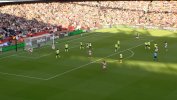DaveTheRef
New Member
Hi all,
Quick one, for those who watched Arsenal vs Southampton yesterday. If Martinelli passed the ball backwards to Kai Havertz (instead of going for goal), would Havertz have been flagged offside? Given he was offside when the ball was played in.
Many thanks
Quick one, for those who watched Arsenal vs Southampton yesterday. If Martinelli passed the ball backwards to Kai Havertz (instead of going for goal), would Havertz have been flagged offside? Given he was offside when the ball was played in.
Many thanks



